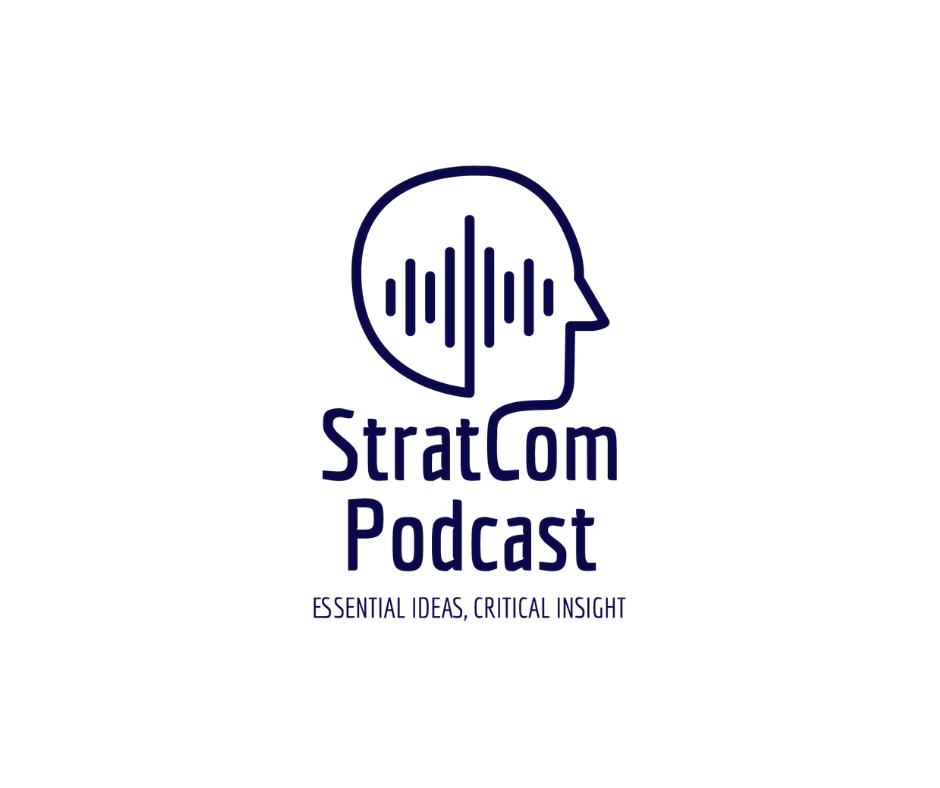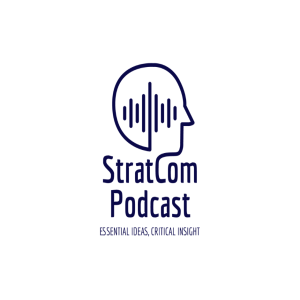
5.5K
Downloads
30
Episodes
Lately, strategic communications seem like fairy dust – if you just sprinkle a bit of that stratcom magic, all your communications problems will be solved. But is it really that easy? In this podcast, we will begin exploring strategic communications from a defence perspective – government and military communications, disinformation, hostile activities on social media, and countering violent extremism.
Episodes

Thursday Dec 14, 2023
Thursday Dec 14, 2023
In 2023 the Center for Countering Disinformation (Ukraine) released an analytical research "Forceful deportation and kidnapping of Ukrainian children" which provided an analysis of the information space and identified hostile information influence campaigns regarding the deportation of Ukrainian children and/or attempts of discrediting Ukraine in this area. This research highlights Kremlin attempts to demonize Armed Forces of Ukraine, discredit Ukrainian government and justify making Ukrainian children a military trophy. Hiding under massive disinformation campaigns and absurd "rescue missions" Russian Federation agents have taken more than nineteen thousand children away from Ukraine since 18 February 2022 (as reported by the Regional Center for Human Rights in Ukraine).
In this #StratComPodcast episode Tomass Pildegovičs sat down with Maryna Vorotyntseva, Adviser to the Head of the Center for Countering Disinformation under the National Security and Defense Council of Ukraine to discuss findings of this research and get Ukrainian perspective on atrocities Russia has been relentlessly conducting on Ukraine's soil.
Discussed research available here: https://shorturl.at/djqJ3

Thursday Nov 02, 2023
Thursday Nov 02, 2023
Japan plays a crucial role in global geopolitics as a major economic and technological powerhouse in Asia. It is also geographically and economically tied to two concerning neighbors - Russia and China. Recent events, especially - the war in Ukraine and following sanctioning of Russia - have complicated diplomatic and economic relations between the two countries, and Japan is now facing a world where countries are grappling with ever-present security challenges.
Amidst turbulence in global security, Tomass Pildegovičs sat down with Dr. Tosh Minohara, Professor of International Relations and Security Studies at the Graduate School of Law and Politics, Kobe University to discuss Japan's perspective on concerning neighbors, debate on the relevance of Japan's pacifist constitution and society's shifting interest in the war in Ukraine.

Friday Sep 22, 2023
Friday Sep 22, 2023
In this episode of the #StratComPodcast, the host Tomass Pildegovičs sat down with Nicholas Fang, Director for Security and Global Affairs at the Singapore Institute of International Affairs, Chair of the Strategic Communications Expert Panel at Singapore’s Ministry of Defence and Founder and Managing Director at the Singapore market and social research agency Black Dot Research to explore disinformation in Singapore.
While the country has made an effort to be ahead of the disinformation threat curve, over the last years, it has experienced multiple large-scale targeted disinformation campaigns aimed at government, political processes, elections, and society in general in the context of the Covid-19 crisis. Has the Singaporean anti-fake news legislation changed the information environment? Is this the practice other countries should consider applying? Has debunking delivered the results Singapore has hoped for?
Listen to the episode for answers to these and other exciting questions!

Friday Sep 01, 2023
Friday Sep 01, 2023
Nestled at the strategically crucial crossroads where Europe converges with Asia, over centuries Georgia has found itself caught in the midst of power struggles. Since its emergence as an independent state in 1991 following the collapse of the Soviet Union, Georgia has once again become a focal point of competing interests, and it's ambitions to join NATO and the EU have added to regional tensions that were further heightened by Moscow's backing of the separatist regions of Abkhazia and South Ossetia, culminating in a war in 2008. This historical backdrop sets the stage for the ongoing complex dynamics in the region.
In this compelling episode of the #StratComPodcast, we are joined by the former Ambassador and Head of Georgia's Foreign Intelligence Service, now Senior Fellow at the FPRI’s Eurasia Program - Batu Kutelia.
Ambassador Kutelia sheds light on Georgia's enduring struggle for freedom and sovereignty in the face of relentless Russian threats. We delve into the complexities of the region's geopolitical landscape and explore the parallels between Russia's imperialistic behavior in Georgia, Ukraine, and on the international stage in general.

Friday May 19, 2023
Friday May 19, 2023
Almost a year and a half have passed since Russia's full-scale invasion of Ukraine. Developments on the battlefield show that there will be no easy victories for Russia. The world awaits with bated breath for Ukraine's counterattack, and there is no doubt that major losses will be on Russia's side.
For the S4E2 of the #StratComPodcast, we sat down with Jānis Sārts, Director of the NATO Strategic Communications Centre of Excellence to learn his outlook on the situation developments. Mr. Sārts talks about the possibility and sensibility of negotiations with Putin, the state of mind of the international community, the long-awaited inclusion of Ukraine into international organizations and more.

Tuesday Jan 10, 2023
Tuesday Jan 10, 2023
Most likely, it is not the first time that the terms "information literacy" or "digital hygiene" come up. But what do those terms actually mean? Is there a basic skill set we need to acquire to survive this information war? Is there a set of activities each of us can do to protect ourselves from disinformation overflowing social media? And most importantly - can we distinguish pieces of disinformation if we do not really know how it is created? If these questions do bother you, this #StratComPodcast episode aims to clear the air.
The conversation with Nika Aleksejeva, Lead Researcher at the Atlantic Council's DFR Lab and Lead Digital Forensic Researcher at the NATO Strategic Communications Centre of Excellence was recorded 3 months after Russia invaded Ukraine. That was also the period when Kremlin was working overtime in attempts to brainwash both domestic and foreign audiences. Nika gives a highly valuable insight into how information war is constructed - from tactics and messages to channels used. And be sure - if you think that Kremlin's propaganda has not reached you yet, you are most likely scrolling through it already. One thing that can make difference here is your ability to recognize malicious activity online and your willingness to spread the word about the damage it does.

Tuesday Dec 13, 2022
Tuesday Dec 13, 2022
Nowadays decision-making process on every level is heavily affected by the digital world and social media in particular. While social media can serve to amplify democratic processes and provide a platform that allows for voices to be heard, the lack of control over hectic processes on various platforms gives malicious actors a space and audience to manipulate with. Luckily, any activity in the digital space leaves a trace in the form of a digital footprint, and applied machine learning comes in handy to sort out this massive amount of data. What researchers have learned about the development of society so far? Are we as a society shaping the digital world or digital world shape us?
During the Riga StratCom Dialogue 2022 conference this May, #StratComPodcast host Tomas Pildegovičs sat down with Dr. Jean-Christophe Boucher, who is an Assistant Professor at the School of Public Policy and the department of political science at the University of Calgary. At present, his research is focused on applied machine learning to understand how the digital world shapes our society, civil-military relations in Canada, as well as vaccine hesitancy on social media with an aim to develop better communications strategies and tools to increase vaccine uptake.

Friday Nov 04, 2022
Friday Nov 04, 2022
Almost nine months have passed since Russia invaded Ukraine, and there are no doubts that the Kremlin has terribly miscalculated both its military capabilities and Ukrainians' will to resist. For Ukrainians, the war has already started in 2014 with the annexation of Crimea, and they have been building their capacity in both military, as well as cognitive domains ever since.
#StratComPodcast host Tomas Pildegovičs sat down with the Co-Founder of the Ukrainian Crisis Media Center and civic activist Natalya Popovich to dig deeper into the foundations of Ukrainian resilience. Natalya shares her insights into how Ukrainian culture, perception of themselves, and history have changed since the annexation of Crimea and how Ukrainians built the image of "professional resisters" by countering Russian information operations long before the Russian army set foot on their soil. She also elaborates on the issue of putting efforts in resisting the country that has invested hugely into building its brand as a region-dominant culture.

Thursday Oct 20, 2022
Thursday Oct 20, 2022
There is one thing that is clear today - social media is another battlefield that nowadays requires a little more than a basic skill set of an internet user to not be fooled. Social media platforms had been widely criticized for the growing level of various threats for social media users versus the lack of response and action from the platforms themselves.
In this episode of the #StratComPodcast Tomass Pildegovičs sat down with Mr. David Agranovich, Director of Global Threat Disruption at Meta (former Facebook) to discuss what Meta has already done and what it is planning to do to make the social media platform less attractive or inconvenient to use for threat actors to reach their goals. Mr. Agranovich also shares some insights on what Meta has observed when analysing Kremlin-related activities on the platform after the February 24.

Wednesday Oct 05, 2022
Wednesday Oct 05, 2022
For several decades Europe has been living in an illusion. Even though Putin's regime has been testing the waters and straining global societies' nerves with provocations of various scales now and then, we were still believing there are no adversaries close by. Russia's unprovoked and horrendous military aggression toward Ukraine has shattered the illusion and left us with many questions - is there room for democracy in times of war? What can Europe learn from Ukraine's democratic resilience? What does it mean to be a European and what values we are not ready to sacrifice to totalitarian regimes?
In this episode of the #StratComPodcast Tomass Pildegovičs sat down with Mr. Raphael Glucksmann, Member of the European Parliament, the Chair of the Special Committee on Foreign Interference in all Democratic Processes in the European Union, including Disinformation to discuss democracy in times of war and how European values are more important than ever.
